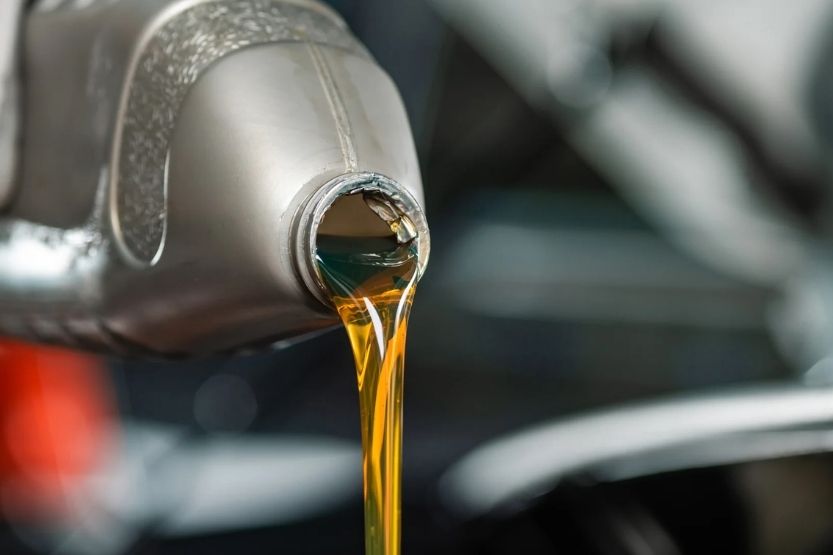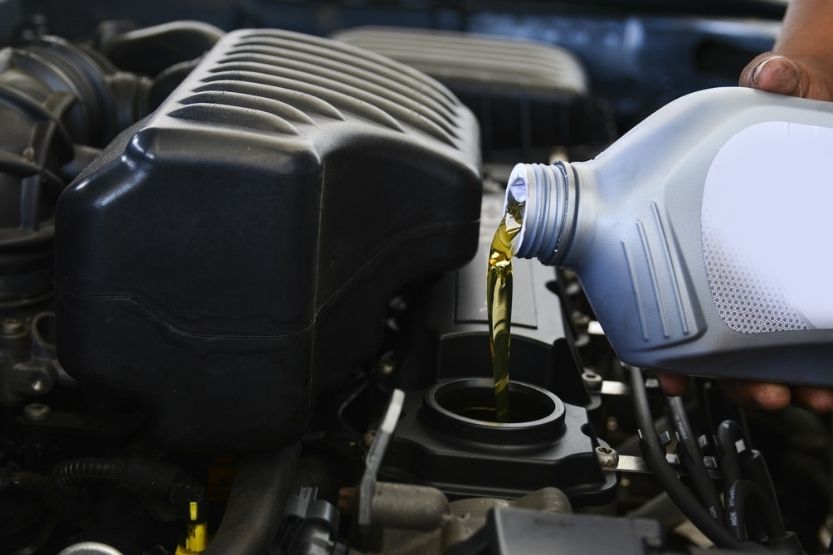Synthetic oil was introduced as a better alternative to conventional mineral-based oil. Experts formulated synthetic oils to have a longer lifespan than regular lubricants. But exactly how long does full synthetic oil last?
On average, the synthetic oil will last for about up to one year, or up to 10,000 miles before it needs to be replaced. This is, however, only an estimate and is subject to change depending on several factors. These include the oil brand, the vehicle’s age, and driving conditions.
Read on to learn more about how long synthetic oil lasts, what factors affect synthetic oil longevity, and more.
How Long Does Synthetic Oil Last?

A full synthetic oil lifespan lasts for approximately one year on average or about 10,000 miles before replacing it. But this is only an estimate and can change depending on several factors, including the oil brand, the vehicle’s age, and driving conditions.
Why Does Synthetic Oil Last Long
Before answering how long synthetic oil lasts, let’s first answer why it lasts. This is because the chemical base of synthetic oils makes them thin at high temperatures. At the same time, it makes them thick at low temperatures. This causes them to wear out at a slower rate.
Synthetic vs Conventional Oils’ Lifespan
Synthetic oil can last for an average of 7,500 to 10,000 miles before needing replacement. This is about six months to a year.
Conventional oils have an oil change interval of up to 6,000 miles, a rough estimate. Plus, the lifespan of synthetic oil depends on several factors, including the type of synthetic oil.
What Is Synthetic Oil
Consists of Artificially-made Chemical Compounds
Synthetic oil is a lubricant consisting of artificially-made chemical compounds. Experts manufacture it using chemically-modified petroleum components instead of whole crude oil. But experts can create it from other raw materials with distilled and modified crude oil as the base materials.
Other Components
Chemists may include the following:
- Additional antioxidants,
- Anti-foaming additives,
- Detergents,
- Viscosity index improvers, etc.
But the actual synthesis process and the composition of additives vary among manufacturers. Generally, they are kept as a trade secret.
Petroleum-refined Oil Alternative
Synthetic oil is employed as a substitute for petroleum-refined oil when operating under extreme temperatures. For instance, aircraft jet engines require synthetic oil, while aircraft piston engines do not.
Advantages of Using Synthetic Oil
1. Resistance to Heat, Oxidation, and Sludge
There are several advantages to using synthetic oil. One of which is its resistance to heat, oxidation, and sludge. It provides better lubrication in conditions of extreme cold.
2. Longer Lifespan
There’s protection from ash and other deposit formation in the engine with synthetic oil. Also, it has a longer lifespan. It is also beneficial to the environment because it generates less oil waste.
3. Performs About 47% Better Than Conventional Oil
According to research, synthetic oil performs around 47% better than conventional oil. It improves automobile performance and fuel efficiency by 1.8 to 5%. However, synthetic oil is significantly more expensive than conventional oil. But synthetic blend oils offer better performance than conventional oils and cost less than pure synthetic oils.
Full Synthetic Oil vs Blended Synthetic Oil
Full Synthetic Oil Lasts Longer Than Synthetic Blend
There are two options: full synthetic oils and synthetic blend oils. Full synthetic oil tends to last longer than a synthetic blend between these two oil types, even more so than conventional or mineral oils.
Outperform Conventional Oils
According to the AAA (American Automobile Association) tests, full and blended synthetic oils both outperformed conventional oils in many ways, including:
- Oxidation resistance,
- Volatility,
- Shear stability,
- Deposit formation, and
- Cold-temperature pumpability.
These features extend the good quality of synthetic oils before an oil change becomes necessary.
Depends on the Synthetic Composition
But in comparing which of the two synthetic oil variants is superior, it comes down to the main synthetic composition of the specified oil. Different oil brands use several synthetic types, each with distinctive characteristics. One of these, polyalphaolefins (PAO), shares an identical chemical makeup with mineral oils common in most vehicles.
Factors Affecting Synthetic Oil Longevity

The use of synthetic oil is not the only factor for prolonging oil change intervals. Synthetic oil lasts before the next oil change also depends on several equally important factors.
These include the following:
- Viscosity Index
- Engine Type
- Accumulated Mileage
- Driving Conditions
- Driving Pattern
- Car Care
- Oil Life Monitors
1. Viscosity Index
An unquestionable fact concerning synthetic oil is that it is more thermally stable than conventional oil. Viscosity grade will have the same effect on conventional oil. But synthetic oil lasts longer. It is typically better since it is more resistant to breaking down in extreme temperatures.
Also, synthetic oil contains additives that do the following:
- Slow down viscosity loss,
- Reduce sludge, and
- Improve wear protection.
2. Engine Type
You can use full synthetic oils on different types of automobile engines. But they don’t guarantee the same kind of longevity on gas-fed or diesel-fed engines as they do on supercharged engines.
Diesel-fed Engines
Diesel is less refined in comparison to gasoline. It produces more contaminants such as soot and acidic by-products. These contaminants significantly affect how long full synthetic oil will last.
Regular and Supercharged Engines
This also applies when we compare standard and supercharged engines. Regular engines stop spinning once the engine is turned off. On the contrary, super- or turbocharged engines continue spinning for a while longer, even after shutting off the engine.
Since a turbocharged engine takes longer to reduce its spin back to idle, it harbors additional high heat in bearing surfaces. This will result in hydrogen and hard carbon deposits that cause more sludge to build up even when synthetic oil is used.
3. Accumulated Mileage
A comparison can also be made between brand-new and high-mileage engines.
High-mileage Engines End up Getting More Unburnt Fuel
Suppose two cars have the same engine type (gas or diesel). The one that has the most mileage will most likely end up getting a larger amount of unburnt fuel into its crankcase. As before, more contaminants getting mixed with fresh synthetic oil will cause its quality to deteriorate faster. This will result in more frequent oil changes.
Frequent Oil Changes Can Have a Reverse Effect
High-mileage cars don’t necessarily have to be vintage. You may consider your car to be so, depending on how you envision using it in the future. Looking at your vehicle from this point of view, frequent oil changes can have a reverse effect.
Veteran drivers have observed that long multi-year oil change intervals decrease the probability of using a vehicle for more than 400,000 miles. This means that if you plan on using your car more frequently than a daily commuter, it may be more suitable to have shorter oil change intervals.
Again, how long does synthetic oil last? On average, synthetic oil can last about six months to one year or around 7,500-10,000 miles. After this period, consider replacing your car’s oil.
4. Driving Conditions
When driving through a highly dusty environment, outside dirt and contaminants can pass through the air filters. It will enter your car, mix with the engine oil, and accelerate its deterioration.
Likewise, driving in hot weather can result in excess moisture and metal fatigue. This leads to engine erosion and premature oxidation. These are but two of the various driving conditions that may negatively impact oil longevity.
5. Driving Pattern
Certain people’s driving style varies according to their lifestyle and geographical location.
For example, vehicles driven by farmers tend to be subjected to harsher service than regular driving. Motorists in big, crowded cities typically encounter more stop-and-go traffic. Drivers located in places that interstate highways can only access are unlikely to get roughed-up engines.
Standard Driving Conditions
This characteristic mainly influences oil change intervals recommended by manufacturers. When you ask, “how long does full synthetic oil last,” the answer that you will usually get online is explicitly based on standard driving conditions.
Recurrent cold starts and short trips diminish valuable oil life and necessitate different, often shorter, oil change intervals. So, if you are advised to get your oil changed annually, regard it with due reservation.
6. Car Care
During the winter, some drivers let their cars sit in the garage. This is under the belief that starting an engine in a sub-zero climate will do the vehicle more harm than good.
Change the Oil Every Fall
If you decide to take this precaution, it is recommended that you change the oil every fall. Do this before you store your car for prolonged periods, no matter the mileage. This will help extend your oil’s life span. Also, it will guarantee that the oil in your engine will remain free of contaminants for the duration of the winter season.
Check Condition of Oil Filters
Another matter that you should look into is the condition of your oil filters. It filters out the harmful elements that cause oil to age faster away from the engine’s interior.
As a crucial component in your engine’s lubrication system, an incompatible or poor-quality filter goes against the point of using premium synthetic oil. This same result is anticipated from a bypassing oil filter, whether or not you plan to avert oil starvation.
7. Oil Life Monitors
Intelligent Oil-Life Monitor System
Most vehicles, particularly late-model ones, are equipped with oil life monitors. These are also known as the Intelligent Oil-Life Monitor System in cars manufactured by Ford and Lincoln.
Track Driving Habits and Conditions
Oil Life Monitor System are high-tech systems that can track driving habits and conditions, including the following:
- Mileage,
- Ignition stops and starts,
- Trip hours, and
- Idle time.
The system will inform the driver of the proper time to get an engine oil replacement based on the collected data.
Compute Oil Change Intervals
Depending on meticulousness, certain oil life monitors will compute oil change intervals based solely on a small number of factors. More advanced systems will consider more variables, including:
- Vehicle speed,
- Engine,
- Ambient temperatures, and
- Several other operating restrictions.
While it is not a given, it should go without saying that the more factors considered, the more accurate the figures will be.
Oil Change Once a Year
Regardless of oil life statistics, most manufacturers advise getting synthetic oil changed once a year. And since oil life monitor data is culled from computer-generated algorithms, you can be assured that it is reliable advice.
Not all cars have sensors installed in their oil pan. But for vehicles that have them, these sensors are still at risk of exposure to contaminants and other potential causes of damage, which may lead to inaccurate readings:
FAQ – How Long Does Synthetic Oil Last?

Can Synthetic Oil Last for Two Years
Several synthetic oil brands claim to have an oil lifespan of up to two years, but this is hardly feasible. The best way to find out how long your oil will last is to consult the service manual of your car. Also, consider your driving habits and other factors that may impact synthetic oil longevity.
Is It Bad to Go 7,000 Miles Without an Oil Change
While synthetic oils can last for more than 7,00 miles, conventional oils require a change from 7,000 to 8,000 miles. This is because the oil gets sludgy and dirty over time. If the oil is worn out, it will drop the cooling function and affect the engine’s interior.
Can You Use Conventional Oil After Using Synthetic Oil
It may depend on the current condition of your engine, as well as the oil you’re using. But normally, changing from synthetic to conventional oil won’t affect your car.
Conclusion – How Long Does Synthetic Oil Last?
The full synthetic oil lifespan lasts for approximately six months to one year before replacement. This translates to 7,500 to 10,000 miles. But this is only an estimate and can change depending on several factors, including the following:
- Oil brand,
- Vehicle’s age, and
- Driving conditions.
There is no set formula that can take every given variable into account. There’s no formula to accurately calculate how many miles it would take before you need to get your oil changed.
As vehicles evolve, manufacturers will keep making constant changes to their recommendations. This is due to an increase in the rate of mechanical parts malfunctioning at low mileage, a rise in long-term repair costs, or any other reason.
The key to extending longevity and maximizing the use of synthetic oil is to keep yourself well-informed. Keep your eyes and ears open for any updates regarding your car’s particular make and model.
It will also help to do some research on new synthetic products introduced to the market. And most of all, your personal preference should be in sync with manufacturer recommendations regarding oil change intervals and using synthetic over conventional oil.
Read next:

![Who Makes Supertech Oil? [Walmart Supertech Synthetic Oil] who makes supertech oil](https://roadsumo.com/wp-content/uploads/2021/06/who-makes-supertech-oil-150x150.jpg)


![How Long Do Subarus Last? [Outback, Impreza, Forester and More] how long do subarus last](https://roadsumo.com/wp-content/uploads/2022/04/how-long-do-Subarus-last-150x150.jpg)



![Read more about the article Can I Use 5w30 Instead of 5w20? [5w30 vs 5w20 Motor Oil]](https://roadsumo.com/wp-content/uploads/2021/04/can-I-use-5w30-instead-of-5w20-300x200.jpg)
